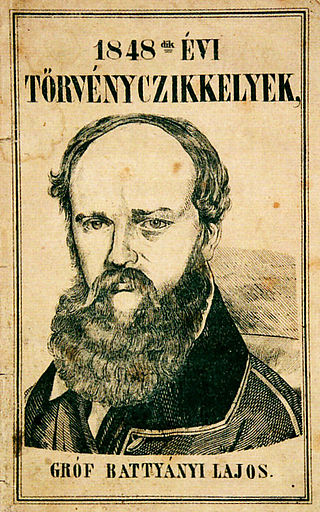April Laws
Collection of laws modernizing the Kingdom of Hungary From Wikipedia, the free encyclopedia
The April Laws, also called March Laws,[1][2] were a collection of laws legislated by Lajos Kossuth with the aim of modernizing the Kingdom of Hungary into a parliamentary democracy, nation state. The laws were passed by the Hungarian Diet in March 1848 in Pozsony (Pressburg, now Bratislava, Slovakia)[3] and signed by king Ferdinand V at the Primate's Palace in the same city on 11 April 1848.[4]
You can help expand this article with text translated from the corresponding article in Hungarian. (October 2019) Click [show] for important translation instructions.
|

The April laws utterly erased all privileges of the Hungarian nobility.[5] In April 1848, Hungary became the third country of Continental Europe [after France (1791), and Belgium (1831) ] to enact law about democratic parliamentary elections. The new suffrage law (Act V of 1848) transformed the old feudal estates based parliament (Estates General) into a democratic representative parliament. This law offered the widest suffrage right in Europe at the time.[6] The imperative program included Hungarian control of its popular national guard, national budget and Hungarian foreign policy, as well as the removal of serfdom.
In 1848, the new young Austrian monarch Francis Joseph arbitrarily "revoked" the laws without any legal competence. This was unconstitutional, (as the laws were in force, because they had already been signed by his uncle king Ferdinand I), and he had no right to revoke them.[7]
18 years later, during the negotiations of the Austro-Hungarian Compromise of 1867, the April Laws of the revolutionary parliament (with the exception of the laws based on the 9th and 10th points) were accepted by Francis Joseph. Hungary did not regain full external autonomy until the Compromise of 1867 which would later influence Hungary's position in World War I.
Twelve Points
The conservatives, who generally stood in opposition to the majority of reforms, managed to retain a narrow advantage in the traditional feudal parliament. On the other hand, the reform-minded liberals found themselves divided in their support for either Széchenyi's or Kossuth's ideas. Immediately before the elections, however, Deák succeeded in reuniting all the Liberals on the common platform of "The Twelve Points". The so-called "Twelve Points" of reformers became the ruling principles of the April laws.
- Freedom of the Press (The abolition of censure and the censor's offices)
- Accountable ministries in Buda and Pest (Instead of the simple arbitrary royal appointment of ministers, all ministers and the government must be elected and dismissed by the parliament)
- An annual parliamentary session in Pest. (instead of the rare ad hoc sessions which was convoked by the king, representative parliament by democratic elections, the abolition of the old estate based feudal parliament)
- Civil and religious equality before the law. (The abolition of separate laws for the common people and nobility, the abolition of the legal privileges of nobility. Full religious liberty instead of moderated tolerance: the abolition of (Catholic) state religion)
- National Guard. (The forming of their own Hungarian national guard, it worked like a police force to keep the law and order during the transition of the system, thus preserving the morality of the revolution)
- Joint share of tax burdens. (abolition of the tax exemption of the nobility, the abolition of customs and tariff exemption of the nobility)
- The abolition of socage. (abolition of Feudalism and abolition of the serfdom of peasantry and their bondservices)
- Juries and representation on an equal basis. (The common people can be elected as juries at the legal courts, all people can be officials even on the highest levels of the public administration and judicature, if they have the prescribed education)
- National Bank.
- The army to swear to support the constitution, our soldiers should not be sent to abroad, and foreign soldiers should leave our country.
- The freeing of political prisoners.
- Union. (with Transylvania, including the re-union of the Hungarian and Transylvanian parliaments, which became separate during the Ottoman wars)[8]
References
Wikiwand - on
Seamless Wikipedia browsing. On steroids.
